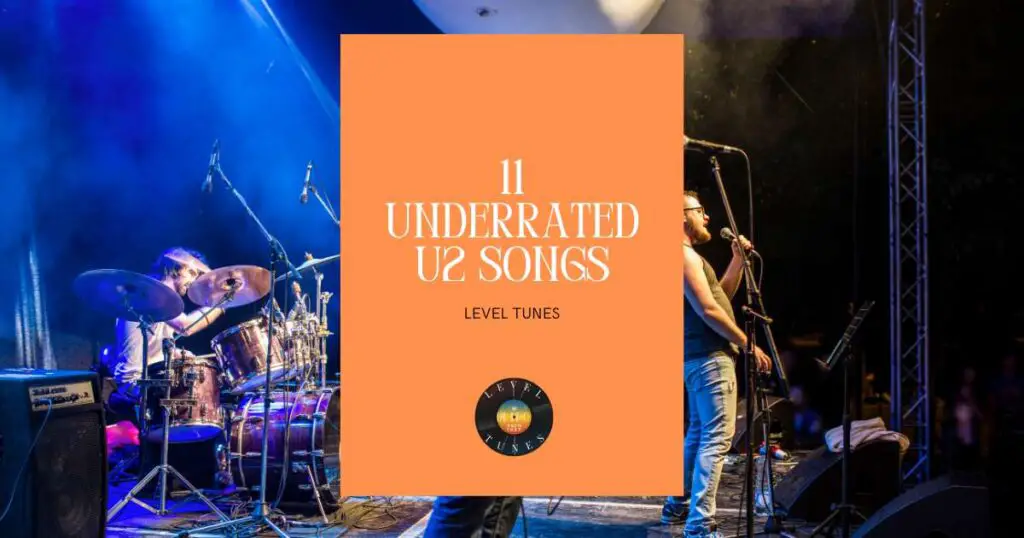11 Underrated U2 Songs: Overlooked Classics
Hey there, music enthusiasts and fellow DJs! It’s TBone here, the heart and soul behind Level Tunes. As a DJ and a devout music lover, I’ve always been fascinated by the hidden gems in the vast universe of tunes.
Today, I’m super excited to dive into a band that’s close to my heart – U2. Now, we all know their chart-toppers, but what about those underrated tracks that don’t always make it to the mainstream airwaves?
That’s exactly why I’ve put together this list of 11 underrated U2 songs.
Each of these tracks showcases the band’s versatility and depth, often overlooked in their more popular hits. So, whether you’re a long-time U2 fan or just curious, join me on this musical journey as we explore the lesser-known yet equally captivating side of one of the world’s most iconic bands.
Let’s uncover these hidden treasures together!
Here are the Underrated U2 songs that you can check out:
List Of Underrated U2 Songs
Underrated U2 songs in a list format:
“A Sort of Homecoming” from “The Unforgettable Fire” (1984, Island Records)
Authored by the entire U2 band – Bono, The Edge, Adam Clayton, and Larry Mullen Jr., “A Sort of Homecoming” is a lyrical masterpiece from their 1984 album “The Unforgettable Fire.” This song captures the essence of longing and belonging with its poetic lyrics and the atmospheric sound that became a signature of this album. The Edge’s echoing guitar riffs, combined with Bono’s passionate vocals, create a dreamy soundscape. I chose this track for its emotional depth and the way it beautifully represents the band’s transition into a more experimental sound.
“Zooropa” from “Zooropa” (1993, Island Records)
“Zooropa,” the title track of U2’s 1993 album, is a futuristic, electronically-tinged anthem that encapsulates the band’s foray into experimental rock. Written by U2 and produced by Flood, Brian Eno, and The Edge, this song stands out for its avant-garde approach, blending spoken word with innovative soundscapes. The song’s critique of consumer culture and media overload makes it a thought-provoking listen. I included “Zooropa” for its boldness in breaking away from U2’s traditional sound, showcasing their willingness to evolve and experiment.
“Acrobat” from “Achtung Baby” (1991, Island Records)
“Acrobat,” a deep cut from U2’s acclaimed 1991 album “Achtung Baby,” is a raw and intense track that often goes unnoticed. The song, written by the band and produced by Daniel Lanois and Brian Eno, features a gritty guitar riff from The Edge and a powerful vocal performance by Bono. It’s a song that delves into themes of disillusionment and the struggle to maintain integrity. I picked “Acrobat” for its emotional rawness and the exemplary way it captures the band’s exploration of darker themes during this era.
“Kite” from “All That You Can’t Leave Behind” (2000, Island Records)
“Kite,” from the 2000 album “All That You Can’t Leave Behind,” showcases U2’s ability to craft poignant and introspective ballads. Written by the band, this song features emotive lyrics about change and letting go, underpinned by The Edge’s soaring guitar work. Bono’s heartfelt vocal delivery adds to the song’s introspective quality. The reason for choosing “Kite” is its lyrical beauty and the way it resonates with listeners’ personal experiences of growth and change.
“Wire” from “The Unforgettable Fire” (1984, Island Records)
“Wire,” another gem from “The Unforgettable Fire,” is a high-energy track marked by The Edge’s edgy guitar lines and Bono’s urgent vocal style. This song, written by U2 and produced by Brian Eno and Daniel Lanois, stands out for its raw power and kinetic energy. It’s a departure from the album’s otherwise ambient texture. “Wire” makes the list for its ability to showcase the band’s rock roots amidst their more experimental works.
“Moment of Surrender” from “No Line on the Horizon” (2009, Island Records)
“Moment of Surrender,” from the 2009 album “No Line on the Horizon,” is a sprawling, soulful epic. Credited to U2 and produced by Brian Eno, Daniel Lanois, and Steve Lillywhite, this song features a mesmerizing blend of electronic and organic sounds. Bono’s reflective lyrics and the song’s gradual build-up create a profound emotional experience. I chose it for its spiritual depth and the way it exemplifies U2’s maturity in their later work.
“Red Hill Mining Town” from “The Joshua Tree” (1987, Island Records)
From the iconic album “The Joshua Tree,” “Red Hill Mining Town” is a song that often gets overshadowed by the album’s big hits. Written by U2, it’s a poignant narrative about the British miners’ strike of the 1980s. The song is notable for its emotive storytelling, underscored by the band’s dynamic musical arrangement. I selected this track for its historical relevance and the compelling way it blends social commentary with engaging music.
“Indian Summer Sky” from “The Unforgettable Fire” (1984, Island Records)
“Indian Summer Sky,” another standout from “The Unforgettable Fire,” is a vibrant and uplifting track. The band, along with producers Brian Eno and Daniel Lanois, crafted a song that combines a driving rhythm section with atmospheric guitar work. The lyrics reflect a yearning for freedom and connection with nature. It’s chosen for its energetic rhythm and the way it captures the essence of the band’s experimental phase.
“In God’s Country” from “The Joshua Tree” (1987, Island Records)
“In God’s Country,” a track from “The Joshua Tree,” is a song that deserves more spotlight for its crisp, shimmering sound and evocative lyrics about disillusionment with the American dream. The Edge’s distinctive guitar work and Bono’s passionate vocals make this a standout track. This song is included for its lyrical depth and the quintessential U2 sound that it embodies.
“Love Is Blindness” from “Achtung Baby” (1991, Island Records)
“Love Is Blindness” is a hauntingly beautiful ballad from “Achtung Baby.” This song, written by U2 and produced by Daniel Lanois, features a minimalist arrangement that allows Bono’s raw, emotional vocal delivery to shine. The Edge’s subtle yet powerful guitar work adds to the track’s intensity. I chose this song for its emotional impact and the stark contrast it provides to the rest of the album’s more vibrant tracks.
“Please” from “Pop” (1997, Island Records)
“Please,” from the 1997 album “Pop,” is an often-overlooked track that showcases U2’s ability to blend political commentary with compelling music. Written by the band, this song features a blend of electronic and rock elements, with poignant lyrics addressing the Troubles in Northern Ireland. The song’s dynamic build-up and powerful chorus make it a memorable track. I’ve included “Please” for its political relevance and the way it highlights the band’s continued evolution in sound and theme.
Fun Facts: Underrated U2 Songs
“A Sort of Homecoming”
- Evolving Live Performances: “A Sort of Homecoming” has evolved significantly in its live performances. Initially played in a style similar to the album version, U2 later transformed it into a more acoustic and stripped-down rendition in their concerts.
- Literary Inspiration: The poetic nature of the lyrics is partly inspired by Bono’s admiration for Irish poets, reflecting a literary depth that’s a hallmark of many U2 songs.
“Zooropa”
- Unexpected Origins: Originally intended as an EP, “Zooropa” evolved into a full album during a break in the Zoo TV Tour. This spontaneous development is a testament to the band’s creative fluidity.
- Award-Winning Design: The album’s cover, featuring a brightly colored, post-modern design, won the Grammy Award for Best Recording Package in 1994.
“Acrobat”
- Fan-Favorite Live: Despite its popularity among fans, “Acrobat” was not performed live until 2018, during the eXPERIENCE + iNNOCENCE Tour, surprising and delighting fans.
- Lyrical Depth: The song is known for its deep and introspective lyrics, with Bono once describing it as a song that is “about a man who has become numb.”
“Kite”
- Emotional Significance: Bono has described “Kite” as a song about letting go of someone, and it is often interpreted as a reflection on his relationship with his children and his own mortality.
- Unique Instrumentation: The song features a rare appearance of a mandolin, played by The Edge, adding a distinctive texture to the track.
“Wire”
- High-Energy Recording: “Wire” is noted for its high-energy recording process, with the band striving to capture the raw and live sound they are renowned for in their concerts.
- Prominent Bass Line: Adam Clayton’s driving bass line is a key feature of the song, underlining the track’s vibrant and kinetic energy.
“Moment of Surrender”
- One-Take Wonder: The album version of “Moment of Surrender” was recorded in a single take, capturing the spontaneous and organic nature of the band’s recording process.
- Collaborative Creation: The song was created during a jam session with producers Brian Eno and Daniel Lanois, highlighting U2’s collaborative approach to songwriting.
“Red Hill Mining Town”
- Social Consciousness: Reflecting U2’s social consciousness, the song’s lyrics were influenced by the 1984 British miners’ strike, a significant event in UK labor history.
- Vocal Challenges: Bono has mentioned that the song’s high notes made it challenging to perform live, which partly contributed to its rarity in concert setlists.
“Indian Summer Sky”
- Nature-Inspired Lyrics: The song’s lyrics are inspired by the beauty of nature and the desire for freedom, themes that resonate with many of U2’s other tracks.
- Sound Experimentation: “Indian Summer Sky” showcases the band’s willingness to experiment with different sounds, blending rock with ambient and electronic elements.
“In God’s Country”
- Cinematic Imagery: The song is known for its vivid and cinematic imagery, painting a picture of the American landscape both physically and metaphorically.
- Compact Power: Despite being one of the shorter songs on “The Joshua Tree,” “In God’s Country” packs a significant punch with its concise and powerful delivery.
“Love Is Blindness”
- Emotional Intensity: “Love Is Blindness” is often cited as one of U2’s most emotionally intense songs, with a raw and vulnerable vocal performance from Bono.
- Jack White’s Cover: The song was famously covered by Jack White, whose version was used in the 2013 film “The Great Gatsby,” introducing the track to a new generation of listeners.
“Please”
- Political Context: “Please” is deeply rooted in the political context of the Northern Ireland conflict, reflecting U2’s engagement with political and social issues.
- Innovative Music Video: The song’s music video, directed by Anton Corbijn, is a black and white masterpiece, capturing the essence of the song’s themes and the band’s artistic vision.
And there you have it, fellow music lovers! We’ve journeyed through the less-traveled roads of U2’s discography, uncovering songs that deserve a spot in the limelight. These tracks, brimming with emotion, innovation, and depth, remind us why U2 remains an enduring force in music. Keep exploring, keep listening!
Thanks for reading.
TBone




